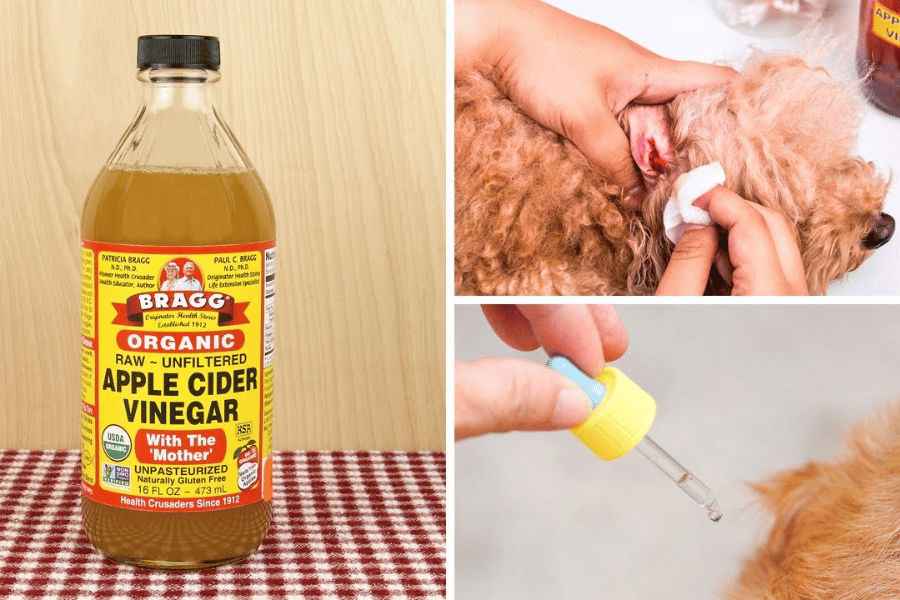In recent years, the natural remedy apple cider vinegar (ACV) has gained significant attention, especially in the realm of pet care. One of the more intriguing applications is using apple cider vinegar on dogs. This traditional ingredient, long praised for its various health benefits in humans, is now being explored as a beneficial addition to our canine friends’ wellness routines.
The idea of using apple cider vinegar on dogs stems from its purported health benefits, which range from improving skin and coat health to aiding in digestion. The natural, holistic pet care movement has driven the popularity of such remedies, with pet owners seeking more organic and less chemically driven solutions for their furry companions.
Dr. Jane Goodall, a renowned ethologist, once noted, “The least we can do is to take care of them and understand their needs.” This sentiment echoes the increasing inclination towards natural remedies like ACV in pet care. Her emphasis on understanding and providing for animals’ needs aligns with the growing trend of incorporating natural products like apple cider vinegar into pet health regimes.
However, while apple cider vinegar is celebrated for its versatility and health benefits, it’s crucial to approach its use on dogs with caution and knowledge. As we delve into the various benefits of apple cider vinegar for dogs, it’s important to keep in mind the need for proper guidance and the potential risks involved.

2 Digestive Health
Apple cider vinegar (ACV) is increasingly recognized for its potential role in promoting digestive health in dogs. As a natural remedy, ACV has been suggested to aid in digestion and alleviate various gastrointestinal issues.
ACV as a Digestive Aid
ACV’s acidic nature can help balance the stomach’s pH levels, potentially aiding in digestion. This is particularly beneficial for dogs who suffer from indigestion or bloating. The presence of acetic acid in apple cider vinegar is thought to encourage the production of stomach acid, which aids in the breakdown of food.
Preventing and Treating Gastrointestinal Issues
In addition to aiding digestion, apple cider vinegar may play a role in preventing and treating common gastrointestinal issues in dogs, such as diarrhea and constipation. Its antibacterial properties can help manage gut flora, promoting a healthy digestive system.
Renowned veterinarian Dr. Karen Becker has often highlighted the importance of gut health in dogs, stating, “A healthy gut is crucial for overall wellness.” She suggests that natural remedies like ACV can be a part of a holistic approach to maintaining digestive health in dogs.
Dosage Guidelines
When considering apple cider vinegar for your dog’s digestive health, it’s essential to follow appropriate dosage guidelines to ensure safety and effectiveness. Generally, the recommended dosage of ACV is about one teaspoon per 50 pounds of body weight, mixed in with your dog’s food or water. However, it’s crucial to start with a smaller dose and gradually increase it to the recommended level, observing your dog’s reaction.
As with any dietary change or supplement, it’s important to consult with a veterinarian before introducing apple cider vinegar into your dog’s diet. This ensures that ACV is suitable for your dog, particularly if they have pre-existing health conditions or are on medication.
While apple cider vinegar shows promise as a digestive aid for dogs, its use should be approached with caution, adherence to dosage guidelines, and consultation with a vet. By doing so, you can safely explore the potential digestive health benefits of ACV for your canine companion.

3 Flea and Tick Control
One of the notable uses of apple cider vinegar (ACV) in canine care is its application in natural pest control, specifically for repelling fleas and ticks. This approach aligns with the growing preference among pet owners for more organic and less harmful pest control methods.
Natural Pest Control with ACV
Apple cider vinegar is acclaimed for its acidic properties, which can be unappealing to fleas and ticks. The theory is that the scent and taste of ACV, which dogs usually carry in their fur after application, act as a deterrent to these pests. This method is especially appealing to pet owners looking to reduce their reliance on chemical-based flea and tick treatments.
Creating a Flea and Tick Repellent Solution
To create an effective flea and tick repellent solution using apple cider vinegar, a simple mixture can be prepared. Mix equal parts of ACV and water in a spray bottle. For added effect, some pet owners include a few drops of a dog-safe essential oil like lavender or cedarwood, which can further repel pests.
Safely Applying ACV to Keep Pests at Bay
When applying the apple cider vinegar solution, it’s important to do so safely:
- Avoid spraying directly into your dog’s eyes, ears, nose, or any open wounds, as ACV can cause irritation.
- Lightly mist your dog’s coat with the solution, being careful not to over-saturate it.
- For sensitive dogs, it’s advisable to do a patch test first to ensure there’s no adverse reaction.
- Reapply the solution regularly, especially after your dog has been bathed or gotten wet.
Dr. Ian Dunbar, a veterinarian and animal behaviorist, emphasizes the importance of natural remedies being part of a broader pest control strategy. He suggests, “While natural remedies like ACV can be effective, they should complement, not replace, a comprehensive flea and tick prevention plan.”
It’s also crucial to consult with a veterinarian before using apple cider vinegar as a flea and tick repellent. They can provide guidance on the suitability and safety of ACV for your specific dog, especially if your pet has a history of skin sensitivities or other health concerns.
Apple cider vinegar offers a natural way to help control fleas and ticks on dogs. However, its efficacy and safety depend on proper preparation, application, and the individual dog’s health and tolerance. Always prioritize your pet’s overall well-being and consult with a vet when considering new treatments.
4 Joint and Mobility Improvement
The holistic approach to pet health increasingly considers apple cider vinegar (ACV) for its potential benefits in enhancing joint health and mobility in dogs, especially for those suffering from conditions like arthritis.
ACV’s Role in Enhancing Joint Health
Apple cider vinegar is believed to contribute to joint health due to its anti-inflammatory properties. The acetic acid in ACV may help in breaking down calcium deposits around the joints and assist in the absorption of essential minerals, which are crucial for joint health. This can be particularly beneficial for aging dogs who often struggle with joint stiffness and pain.
Alleviating Arthritis Symptoms in Dogs
Arthritis, a common issue in many dogs, especially as they age, can significantly impact their quality of life. The anti-inflammatory effect of apple cider vinegar is thought to alleviate the pain and discomfort associated with arthritis. It can help in reducing inflammation and swelling in the joints, thereby improving mobility.
Dr. Stanley Coren, a renowned psychologist and author who specializes in canine behavior, suggests that “Incorporating natural supplements like ACV can aid in managing arthritis symptoms, alongside regular veterinary care.” This holistic approach can enhance the overall well-being of dogs suffering from joint issues.
Dosage and Administration for Joint Health
When considering apple cider vinegar for your dog’s joint health, it’s important to follow proper dosage and administration guidelines:
- The general recommended dosage is approximately one teaspoon of ACV per 50 pounds of body weight. It can be mixed into your dog’s food or water.
- Begin with a smaller amount to ensure your dog tolerates it well, then gradually increase to the full dosage.
- Always use raw, unfiltered, and organic apple cider vinegar to ensure it contains the ‘mother’, which is rich in beneficial enzymes.
As with any supplement, it is crucial to consult with your veterinarian before introducing apple cider vinegar into your dog’s diet, especially if your dog is already receiving medication for joint issues or has other health problems.
while apple cider vinegar is not a cure-all, it may offer supplementary benefits in improving joint health and mobility in dogs, particularly those suffering from arthritis. However, its use should be approached with caution, proper dosage, and in consultation with a veterinarian. This ensures a safe and holistic approach to enhancing your dog’s joint health.

5 Oral Health
Maintaining good oral health is crucial for a dog’s overall well-being. Recently, apple cider vinegar (ACV) has gained attention for its potential benefits in dental hygiene for dogs. This natural remedy could offer a complementary approach to traditional dental care methods.
Maintaining Your Dog’s Dental Hygiene with ACV
The acidic nature of apple cider vinegar can help in maintaining oral hygiene in dogs. Its antimicrobial properties may contribute to reducing plaque and bacteria in the mouth, which are common culprits of dental issues. Additionally, ACV can aid in keeping the gums healthy, thereby preventing gum diseases which are prevalent in canine dental problems.
Fighting Bad Breath and Preventing Dental Problems
Bad breath in dogs can often be a sign of underlying dental issues. Apple cider vinegar can play a role in combating bad breath by balancing the pH levels in your dog’s mouth, creating an environment less conducive to the bacteria that cause bad odors. Regular use of ACV as part of oral care can assist in preventing dental problems like tooth decay and gum disease.
Dr. Marty Becker, a veterinarian known for his advocacy of proactive pet care, states, “Integrating natural products like ACV can be beneficial for oral health, but they should not replace regular veterinary dental check-ups.” This underscores the importance of a comprehensive approach to dental care.
Safe Methods of Using ACV for Oral Care
When using apple cider vinegar for your dog’s oral health, it is important to do so safely:
- Dilute ACV with water (a recommended ratio is one part ACV to two parts water).
- Use the solution to gently wipe your dog’s teeth and gums using a soft cloth or a dental wipe. Avoid using a toothbrush as the acidity might irritate the gums.
- Never use undiluted ACV directly in your dog’s mouth, as it can be harsh and cause irritation.
- Start with a small amount to ensure your dog tolerates it, then gradually incorporate it into their regular dental routine.
- Offer fresh water after using the ACV solution to rinse your dog’s mouth.
It’s crucial to consult with your veterinarian before introducing apple cider vinegar into your dog’s dental care routine. They can advise on the suitability and safety of ACV for your specific dog, especially if they have existing dental issues or sensitivities.
While apple cider vinegar can offer benefits for maintaining oral health in dogs, its use should be part of a broader dental care strategy, including regular veterinary check-ups and traditional dental care practices. Proper dilution, application, and veterinary guidance are key to safely integrating ACV into your dog’s oral hygiene regimen.
Potential Risks and Precautions
While apple cider vinegar (ACV) is touted for its various benefits in canine care, it’s essential to be aware of the potential risks and necessary precautions to ensure the safety and health of your dog.
Exploring Possible Side Effects of ACV on Dogs
ACV, like any supplement, can have side effects, particularly if used improperly or in excess. Potential side effects in dogs may include:
- Gastrointestinal Upset: In some dogs, ACV can cause gastrointestinal issues like vomiting or diarrhea, especially if consumed in large amounts or undiluted.
- Acidic Reaction: The acidic nature of ACV can irritate the skin, eyes, and mucous membranes of some dogs, especially if applied undiluted.
- Tooth Enamel Erosion: Frequent use of ACV in oral care without proper dilution can lead to the erosion of tooth enamel over time.
- Interference with Medications: ACV may interact with certain medications, such as diuretics or insulin, which can be problematic for dogs with pre-existing health conditions.
Safety Measures to Consider Before Use
To safely incorporate ACV into your dog’s routine, consider the following safety measures:
- Dilution is Key: Always dilute ACV appropriately before use, whether applying it topically or adding it to your dog’s food or water.
- Start Slowly: Introduce ACV gradually into your dog’s diet or care regimen to gauge their reaction.
- Avoid Overuse: Using ACV in moderation is crucial to prevent potential side effects.
- Spot Testing: For topical applications, conduct a spot test to ensure your dog doesn’t have an adverse skin reaction.
- Rinse Thoroughly: If used for grooming or oral care, ensure that ACV is thoroughly rinsed off or followed up with fresh water to avoid prolonged exposure.
Consultation with a Veterinarian
Before introducing apple cider vinegar or any new supplement to your dog’s routine, a consultation with a veterinarian is paramount. This is particularly important for dogs that:
- Have pre-existing health conditions.
- Are on medication.
- Have a history of skin sensitivities or allergies.
Dr. Sophia Yin, a well-respected veterinarian and animal behaviorist, emphasized the importance of professional guidance, stating, “Each dog is unique, and what works for one may not work for another. Always seek veterinary advice before trying new treatments.”
While apple cider vinegar can offer various benefits for dogs, its use comes with potential risks that must be carefully managed. Adhering to safety measures, using ACV in moderation, and consulting with a veterinarian are crucial steps in ensuring the safe and beneficial use of ACV in canine care.
Frequently Asked Questions (FAQ)
4.1 Can I use any type of apple cider vinegar on my dog?
When it comes to using apple cider vinegar (ACV) on dogs, not all types are created equal. The most recommended type of ACV is organic, raw, and unfiltered, which contains the ‘mother’. The ‘mother’ in ACV is a cluster of beneficial bacteria, enzymes, and proteins, which are believed to contribute to its health benefits. Processed or filtered ACV, on the other hand, may lack these beneficial components. Therefore, choosing the right type of ACV is crucial for ensuring the most benefits for your dog.
4.2 How often should I apply apple cider vinegar to my dog’s skin?
The frequency of ACV application on your dog’s skin depends on the purpose of use and your dog’s sensitivity. For general skin health or as a flea repellent, a diluted ACV solution can be applied once or twice a week. However, if your dog has sensitive skin, it’s advisable to reduce the frequency or dilution ratio. Always observe your dog’s reaction to the application and adjust accordingly.
4.3 Is it safe to give my dog apple cider vinegar internally?
ACV can be given internally to dogs, but it’s essential to do so safely. The general guideline is to add about one teaspoon of ACV per 50 pounds of your dog’s body weight to their food or water. Start with a smaller amount to ensure your dog tolerates it well. It’s also important to consult with your veterinarian before adding ACV to your dog’s diet, especially if your dog has health issues or is on medication.
4.4 Can apple cider vinegar replace traditional flea and tick preventatives?
While ACV may serve as a natural flea and tick repellent, it should not be relied upon as the sole preventative measure. Traditional flea and tick preventatives are typically more effective and long-lasting. ACV can be used as a complementary measure but should not replace veterinarian-recommended flea and tick control products, especially in areas with high infestations.
4.5 Are there any dogs that shouldn’t use apple cider vinegar?
Yes, there are situations where ACV may not be suitable. Dogs with certain health conditions, such as kidney disease, or those with a history of gastrointestinal sensitivity, should avoid ACV. Puppies, particularly under six months of age, should not be given ACV due to their developing digestive systems. Additionally, dogs with open wounds or skin lesions should not have ACV applied to their skin. Always consult with a veterinarian before using ACV, particularly for dogs with specific health concerns or conditions.